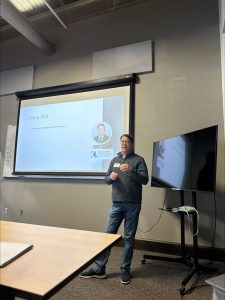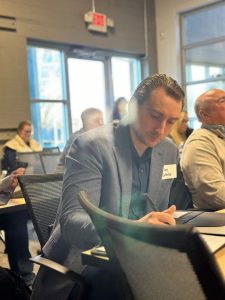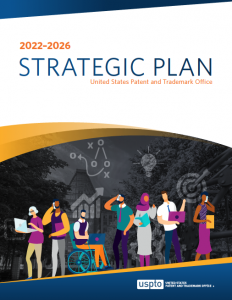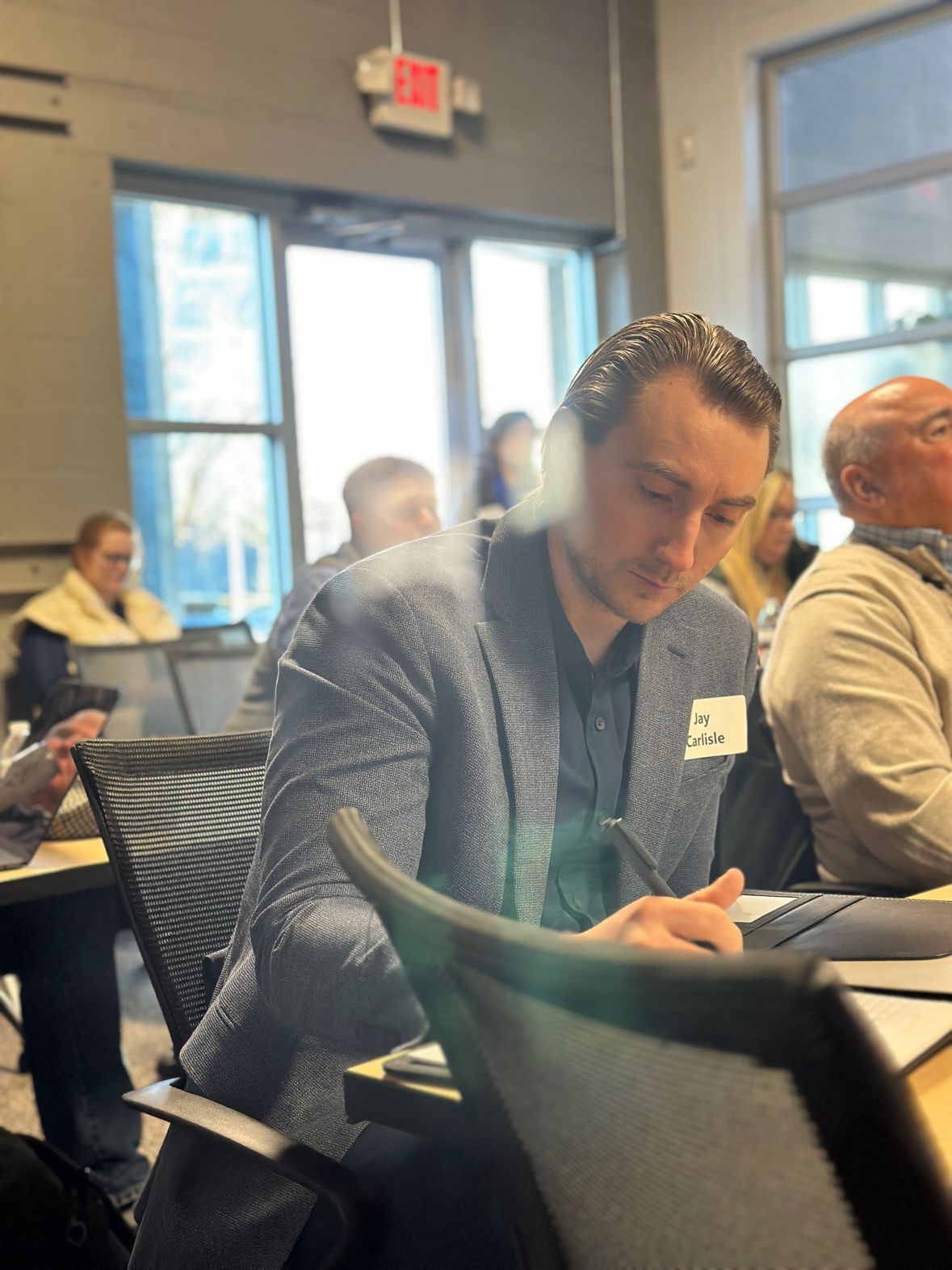
Contingency Planning and Disruptions: Preparing for a Typhoon
At the recent NEXT Upstate’s Founders Forum, our firm’s founder Attorney Doug Kim spoke to business owners about contingency planning and the crucial steps they should take to prepare for disruptions. He speaks from personal experience. In May 2023, during a diving expedition to Truk Lagoon Micronesia, unexpected challenges unfolded, leading to an extended stay due to flight delays caused by Typhoon Mawar.
Before the one-in-a-lifetime journey began, Doug and the rest of the firm prepared meticulously, including informing clients, designating a point of contact, and addressing administrative tasks. Despite facing unexpected delays and limited communication options during the trip that Mother Nature extended by two weeks, the firm’s established policies and procedures allowed for effective management of the disruption. We didn’t miss a beat!
The resilience of our firm’s operations, enabled by our SaaS tech stack, cloud storage, and VPN, allowed for continuous communication and work progress. The ability to triage and prioritize tasks ensured that essential work continued, even in the face of uncertainties. The experience highlighted the importance of having contingency plans in place, especially when unforeseen circumstances lead to an unexpectedly prolonged absence.
While the incident tested the firm’s resilience, it also provided valuable insights into the effectiveness of remote work capabilities. It underscores the need for businesses to not only anticipate disruptions but also to implement robust contingency plans that encompass various scenarios, ensuring continued functionality and adaptability in the face of the unexpected.
Key Takeaways:
Complete a Comprehensive Business Analysis Impact Report:
Doug emphasized the importance of conducting a thorough business analysis impact report. Scrutinize all business functions, applications, and services to identify vulnerabilities and potential areas of risk. By understanding how disruptions might impact different facets of the business, owners can proactively implement measures to mitigate risks.
Protect the Essentials for Revenue Generation:
Protecting what’s vital to revenue is paramount. Doug advised business owners to identify and secure the critical components that drive revenue. This includes safeguarding key assets, client relationships, and proprietary technologies. By prioritizing these elements, businesses can enhance their resilience against disruptions that may threaten their financial stability.
Cross-Train Teams and Establish Succession Plans:
Cross-training teams is a strategic move to ensure that no single person holds exclusive knowledge or skills critical to business operations. For solopreneurs, Doug recommended finding a trusted friend who can serve as a backup and hold a spare set of keys to the castle. This not only mitigates risks associated with personnel dependencies but also ensures a smoother transition in case of unforeseen circumstances.
Develop a Comprehensive Communications Plan:
Effective communication is key during times of disruption. Doug suggested creating both internal and external communications plans. Internally, it’s crucial to designate a person in charge and establish clear communication channels. Externally, keeping clients and vendors informed is essential for maintaining trust. Additionally, evaluating the need for public relations (PR) during crises ensures that the business’s image is carefully managed.
Data Recovery Strategies:
Doug outlined a robust data recovery strategy involving the maintenance of three copies, two backups, and one offsite storage. This ensures data redundancy and protection against data loss. Incorporating third-party solutions that are geographically untethered adds an extra layer of security.
Measures to Safeguard Property and Funds:
To protect property and funds, Doug recommended internal agreements such as employment and independent contractor agreements. Safeguarding intellectual capital (IP), having duplicate vendors, and establishing an incident response team, both internally and externally, further fortify the business against unforeseen events.
Insurance and Contract Clauses:
The importance of insurance in contingency planning cannot be overstated. Doug suggested considering insurance coverage tailored to the specific risks faced by the business. Additionally, including contract clauses that outline provisions for emergency use of electronic data processing equipment helps manage expectations in case of equipment failures.
By incorporating contingency planning strategies, entrepreneurs can build resilient businesses capable of withstanding disruptions and adapting to changing circumstances. As Judson L Moore aptly stated, “A bad plan is better than no plan,” emphasizing the significance of flexibility in adapting and refining strategies as circumstances evolve.
- Check out local news coverage of “Stuck in Truk”
- Learn more about NEXT Upstate’s Founders Forum series.
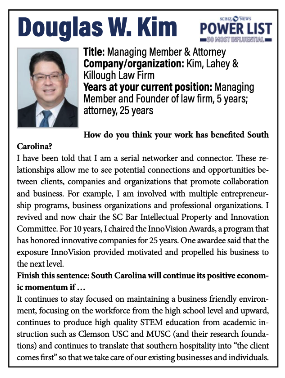
SC Biz News Selects Attorney Doug Kim for 50 Most Influential List 2023
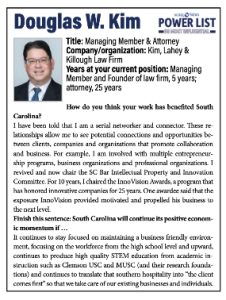 SC Biz News Magazine names Attorney Doug Kim, founder of the Kim, Lahey & Killough Law Firm, one of the 50 Most Influential People in South Carolina for 2023. The magazine’s editor says Doug and the other executives recognized are “why South Carolina’s economic engine is humming and why people are flocking here to live, work, and play.”
SC Biz News Magazine names Attorney Doug Kim, founder of the Kim, Lahey & Killough Law Firm, one of the 50 Most Influential People in South Carolina for 2023. The magazine’s editor says Doug and the other executives recognized are “why South Carolina’s economic engine is humming and why people are flocking here to live, work, and play.”
Doug says, “It’s humbling to be honored with this recognition. My philosophy, and the philosophy of our firm, is that we all win by helping others. It’s a pleasure to work with so many organizations across our state whose mission is to strengthen our innovation and entrepreneur ecosystems.”
Click here to read the online publication. It includes an excerpt from Doug’s answers to the SC Biz News questionnaire. The full questionnaire and Doug’s answers are below.
What is your greatest career achievement/accomplishment?
Most importantly, I am so thankful for the relationships in my life. I am grateful for family, friends, clients, and collaborators. I realize how lucky I am to be surrounded by such quality people. I am also very proud that I’ve been able to make one of my dreams a reality, which is starting a law firm that is based upon modern business principles to service our clients, while also providing a working environment for other attorneys and staff so that they can be successful is quite rewarding. Seeing these attorneys and staff grow and succeed is quite fulfilling.
As for external wins, one with some of the most impact was hailed as a big win for the photography industry. The 2-year battle revolved around a company’s attempt to enforce a software patent, contending it owned exclusive rights to a data processing system for grouping photographs together.
In the fall of 2018, Snapizzi, a Washington state corporation, began contacting ImageQuix, a Greenville-based software company, about its patented image-tagging technology (U.S. Patent 8,794,506). ImageQuix had just released Blueprint, its latest photography workflow software that also included image tagging to sort and organize large volumes of images.
From the beginning, we believed the Snapizzi patent was invalid and that its claims were in violation of the Alice ruling, which covers “abstract ideas” that are therefore ineligible for patent protection. We’re happy both the District Court and the Federal Circuit Court of Appeals agreed with us.
What is South Carolina’s biggest strength?
South Carolina has a pro-business climate that fosters growth. There are entrepreneur ecosystems, networks of resource partners, across the state that help attract and grow innovative entrepreneurs, as well as international companies.
What is South Carolina’s biggest challenge?
In order to keep high-growth businesses in the Palmetto State (when they’re actively being recruited by our neighbors), we must shift from the regional mentality that’s currently in the Upstate, the Midlands, and the Lowcountry to more of a unified state-wide effort of inclusivity. If Myrtle Beach is launching an entrepreneur ecosystem, for example, there’s no need for our neighbors to recreate the wheel. We all benefit from sharing ideas – what works, what doesn’t work. The challenge is how to make that happen when we are, as a state, so regionalized.
How do you think your work has benefited South Carolina?
I have been told that I am a serial networker and connector. These relationships allow me to see potential connections and opportunities between clients, companies, and organizations that promote collaboration and business. For example, I am involved with multiple entrepreneurship programs, business organizations, and professional organizations. I revived and now chair the SC Bar Intellectual Property and Innovation Committee. For 10 years, I chaired the InnoVision Awards, a program that has honored innovative companies for 25 years. One awardee said the exposure InnoVision provided motivated and propelled his business to the next level.
Finish this sentence: South Carolina will continue its positive economic momentum if …
It continues to stay focused on maintaining a business-friendly environment, focusing on the workforce from the high school level and upward (e.g., the South Carolina Governor’s School of Science and Mathematics – for which I sit on the foundation board), continues to produce high-quality STEM education from academic instruction such as Clemson USC and MUSC (and their research foundations) and continues to translate that southern hospitality into “the client comes first” so that we take care of our existing businesses and individuals – including those that are here enjoying this great state and those that are soon to come.
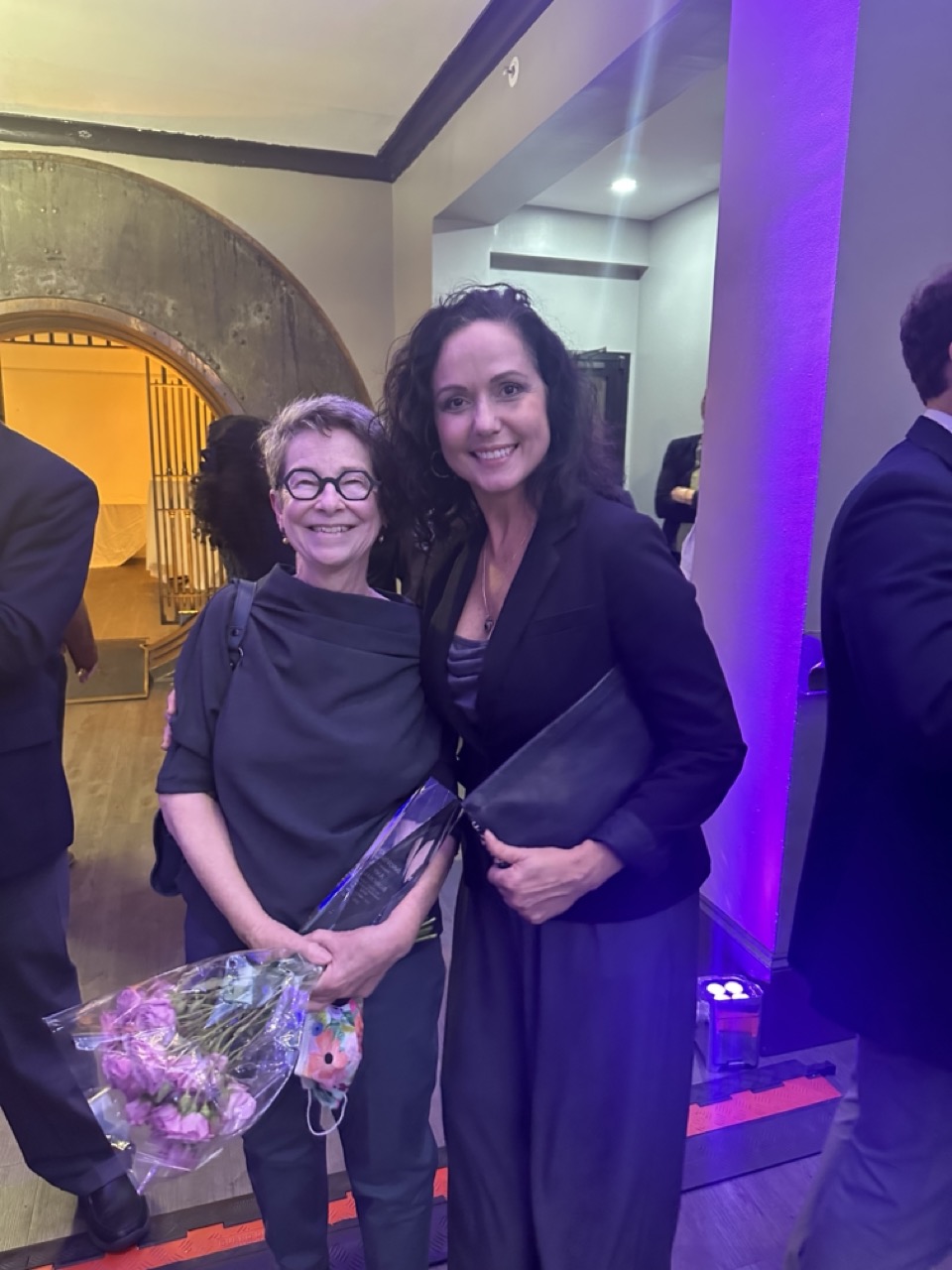
The 2023 InnoVision Award winners
As a sponsor of the InnoVision Awards organization, the Kim, Lahey & Killough Law Firm is proud to share the news about this year’s winners. Application and nominations opened this past spring the organization received almost 100 nominations and applications. These submissions showcased innovations across the state in a variety of industries including mental health, construction, medicine, educational programming, and much more. The selected panel of judges reviewed each application and scored the organizations that provided the 2023 finalists and winners for six of their eight awards. The Charles Townes Individual Achievement Award and Dr. Janajreh Ibrahim Young Innovator Award were carefully considered and voted on by the InnoVision Awards Board of Directors, which includes Attorney Hunter Freeman. These organizations were recognized during the in-person celebration on November 9th in Columbia, South Carolina.
The Dr. Charles Townes Individual Achievement Award – Sponsored by Kyocera AVX
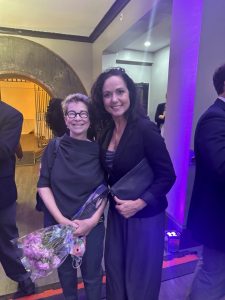
The highest honor awarded by the InnoVision Advisory Board and Judges panel is the Dr. Charles Townes Individual Achievement Award. The award is named in memory of Dr. Charles Townes, a Greenville, South Carolina native and Furman University graduate. He was awarded the Nobel Prize in Physics in 1964 and the Templeton Prize in 2005. Dr. Townes is the only person other than the Dalai Lama and Mother Teresa to win both a Nobel Prize and a Templeton Prize. The Dr. Charles Townes Individual Lifetime Achievement Award honors an individual who has exhibited a sustained commitment to the advancement of technology and the community through their technology-oriented and innovative contributions. Such contributions may be business, civic, and/or educational and must benefit the State of South Carolina.
The Dr. Charles Townes Individual Achievement Award winner this year is Amy Robichaud. Amy and her leadership helped push innovation in the Palmetto State and provided a spotlight for innovators. She was one of the founding members of InnoVision Awards which is celebrating its 25th anniversary this year. Amy’s work gave recognition and awareness to innovations, and collaborations with organizations across the state, and helped foster an innovation ecosystem that is thriving today. Amy Robichaud is the backbone of the InnoVision Awards and one of the rare individuals who can do it all.
The Ibrahim Janajreh Young Innovators Award – Sponsored by Designli
The award is named in honor of the memory and ideals of Dr. Ibrahim Janajreh. A brilliant scientist and unique individual, Dr. Janajreh was an important part of Michelin for more than 15 years, served on the InnoVision Advisory Board of Directors for three years, and received an InnoVision Award in 2000. The Ibrahim Janajreh Young Innovator Award was established in 2005 to recognize successful South Carolina programs that engage, encourage, and acknowledge young people in the areas of science, technology, math, and innovation.
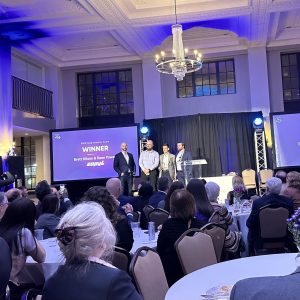 The Young Innovators Award winners this year are Sean Powers and Brett Nilsen from Copyt. Copyt is a platform for sneaker resellers to easily connect, manage inventory, and act as a sales channel automation. Individuals can list sneakers on multiple platforms and manage listings through Copyt. Sean and Brett found difficulty keeping up with multiple platforms as missteps can hurt a seller’s reputation and lead to cancellation fees, this caused the creation of the company.
The Young Innovators Award winners this year are Sean Powers and Brett Nilsen from Copyt. Copyt is a platform for sneaker resellers to easily connect, manage inventory, and act as a sales channel automation. Individuals can list sneakers on multiple platforms and manage listings through Copyt. Sean and Brett found difficulty keeping up with multiple platforms as missteps can hurt a seller’s reputation and lead to cancellation fees, this caused the creation of the company.
Technology Development Award – Sponsored by SCTech
The InnoVision Technology Development Award recognizes a company or organization for the development of a new or improved technology. The focus of this award is on the novelty of the technology and the challenge associated with developing it. The technology may be part of a new or existing product, process, or service that is intended for sale to customers or use inside the organization.
The 2023 Technology Development Award winner is Pensievision. Pensievision is developing 3D modeling technology which can be applied in various healthcare applications. One imaging device, CervImage, is helping diagnose cervical cancer which is extremely common but treatable if caught early. The device produces high-resolution 3D images of the area for early detection and analysis of legions. This method provides the true shape and size which assists with accurate diagnoses. Pensievision’s goal is to spread this technology and save countless lives. There were two other finalists for the award, GlycoPath and Kiyatec. Gylcopath is using biomarkers, the Glycotyper Assay, for early disease detection and progression. Kiyatec is a cancer diagnostic company that will test patient cells to find which chemotherapy treatment will react best.
Technology Application Award – Sponsored by SCRA
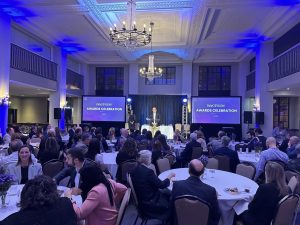 The InnoVision Technology Application Award recognizes a company or organization for the innovative application of an existing technology. The focus of this award is on how an existing technology is applied to create new value. The technology may be applied to a product, process, or service that is intended for sale to customers or use inside of the organization.
The InnoVision Technology Application Award recognizes a company or organization for the innovative application of an existing technology. The focus of this award is on how an existing technology is applied to create new value. The technology may be applied to a product, process, or service that is intended for sale to customers or use inside of the organization.
The 2023 Technology Application Award winner is SpheroFill. SpheroFill repurposed defense technology to develop a platform for drug delivery. The molecules in the device vary in size depending on what drug is, this allows SpheroFill to release medicine at different times and amounts while having all products in one device. There is also an option for extended-release over hours, days, or weeks. There were two other finalists for the award, Builder Rocket and Zylö Therapeutics. Builder Rocket created a platform where home builders can choose every aspect of the home and a picture is created for the builders so all parties agree and make an easier building process. Zylö Therapeutics developed a sustained-release drug delivery system for topical administration to increase the rate of drug penetration and effectiveness.
Small Business Award – Sponsored by Robinson Ventures
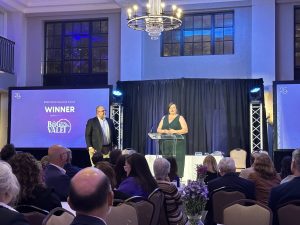 The InnoVision Small Business Award honors organizations for their creative technology development or innovative technology application. This innovation can be applied to a product, process, or service that will be sold to consumers or can be used inside a small business. Eligible awardees must employ fewer than 10 full-time employees and generate less than $5 million in revenue.
The InnoVision Small Business Award honors organizations for their creative technology development or innovative technology application. This innovation can be applied to a product, process, or service that will be sold to consumers or can be used inside a small business. Eligible awardees must employ fewer than 10 full-time employees and generate less than $5 million in revenue.
The 2023 Small Business Award winner is BagValet in Charleston. BagValet offers pickup, dropoff, and storage for bags during the time gaps between flights and accommodation check-in or check-out. Customers can request baggage pickup in as little as 30 minutes and items are stored with tamperproof locks for added security. This organization was founded by Amanda Sheridan as a solution to the ‘Luggage Struggle’ where tourists were dragging their bags on walking tours and around the city. BagValet has proven to be a success in Charleston and would like to scale nationally. There were two other finalists for the award, Maelstrom Propellers and Southeast IP Group. Maelstrom Propellers has created a safer and more effective propeller, the Eddy, which users can use less power to move through the water and reduces injuries. Southeast IP Group developed ANGEL, a drone rescue for distressed swimmers that will act as a floatation device to save lives.
Education Award – Sponsored by Contec
The InnoVision Education Award recognizes innovative approaches to education that create new educational opportunities and experiences for students, new methods of delivery, or improved quality and efficiency.
The 2023 Education Award winner is Notey. Notey is building an interactive education app to encourage music learning among children. The games on the platform will help motivate children to come back and learn their instrument. A vast majority of people with try an instrument and quit in a few weeks but Notey is working to make music learning a lifelong skill. There were two other finalists for the award, Converse University and Richland Two Institute of Innovation. Converse University is growing the Data Science program with a minor focusing on data visualization, ethics, coding, and broad applications, a general education course, and making partnerships in the area. Richland Two Institute of Innovation is individualizing instruction education for students to enjoy school and better retain information.
Sustainability Award – Sponsored by Velux
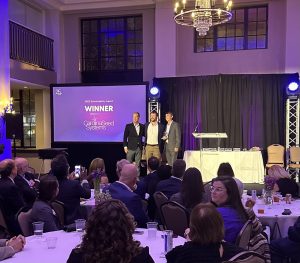 The InnoVision Sustainability Award recognizes an organization for an innovative approach to environmental stewardship. The focus of this award is on innovative technology, processes, and/or business models that promote the protection of the earth’s natural resources including renewable energy, renewable materials, reduced energy consumption, or reduced waste.
The InnoVision Sustainability Award recognizes an organization for an innovative approach to environmental stewardship. The focus of this award is on innovative technology, processes, and/or business models that promote the protection of the earth’s natural resources including renewable energy, renewable materials, reduced energy consumption, or reduced waste.
The 2023 Sustainability Award winner is Carolina Seed Systems. Carolina Seed Systems is addressing the feed demand issue in the south as the animals here need more than the area can provide. The company uses existing sorghum and naturally manipulates the variation to create other strains for several uses. The company’s product is helping other farmers meet their needs and reducing carbon emissions from traditional practices. There were two other finalists for the award, Gravity Driven Technologies and Living Carbon. Gravity Driven Technologies produce power by converting movement in a vehicle to electricity to address problems with the nation’s power grid. Living Carbon is reducing carbon emissions through afforestation, reforestation, and revegetation efforts using Living Carbon Climate Smart Seedlings.
Community Service Award – Sponsored by Insperity
The InnoVision Community Service Award recognizes an organization for an innovation that improves the quality of life in South Carolina communities. The innovation may involve products, services, or processes that serve South Carolinians.
The 2023 Community Service Award winner is Open Broadband. Open Broadband recognizes the increased need for internet across the state and works to make it more accessible. The company aims to serve areas where the internet is not readily available or where other internet providers cannot reach. Open Broadband broadcasts a fiber optic network from an antenna that connects with receivers in homes. There were two other finalists for the award, Health Evolve Technologies and Just Bee. Health Evolve Technologies is closing the gaps in health disparities among women by creating an app to track progress and assessments to determine at-risk individuals. Just Bee created a social impact app that trains businesses how to understand and accommodate individuals with autism to make public spaces more accessible.
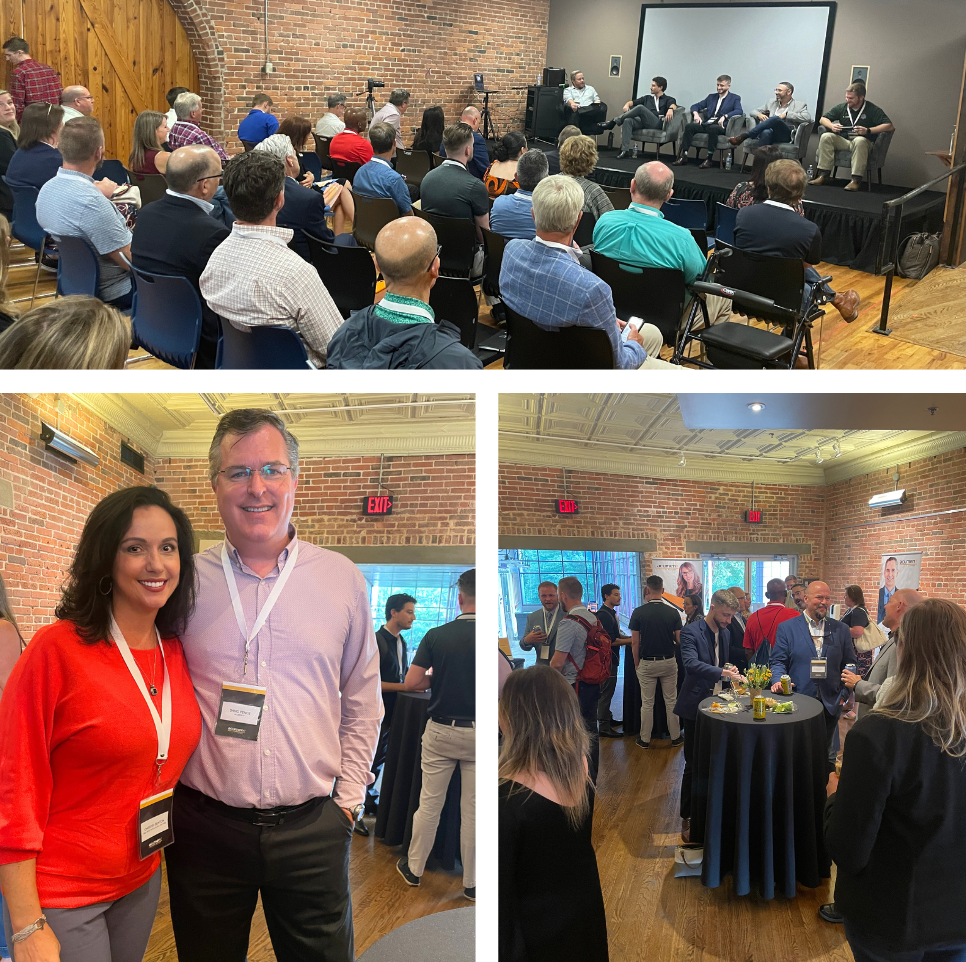
IT Security Strategies in the Age of AI
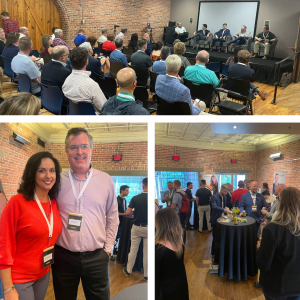 The cybersecurity landscape has undergone a seismic shift in the aftermath of the COVID-19 pandemic. We’ve moved past the era of deceptive Nigerian email scams to confront highly organized and tech-savvy cybercriminals, many of whom employ advanced AI-driven tactics. Small businesses, in particular, are bearing the brunt of ransomware attacks because they often lack the financial cushion to fend off these digital marauders. In this blog post, we will delve into the key takeaways from Acumen IT’s event, “IT Security Strategies in the Age of AI,” held in Greenville in October 2023.
The cybersecurity landscape has undergone a seismic shift in the aftermath of the COVID-19 pandemic. We’ve moved past the era of deceptive Nigerian email scams to confront highly organized and tech-savvy cybercriminals, many of whom employ advanced AI-driven tactics. Small businesses, in particular, are bearing the brunt of ransomware attacks because they often lack the financial cushion to fend off these digital marauders. In this blog post, we will delve into the key takeaways from Acumen IT’s event, “IT Security Strategies in the Age of AI,” held in Greenville in October 2023.
The Evolution of Cybercrime
Cybercrime has transitioned from the work of lone individuals operating out of basements to well-structured businesses with deep knowledge of your organization. AI now plays a significant role in orchestrating attacks, making them more efficient and devastating.
Ransomware attacks, in particular, have surged, with small businesses being prime targets due to their vulnerability. Many small businesses lack the financial resources to pay a ransom or defend against such attacks. To combat these threats effectively, here are three crucial strategies to consider:
- Employee Training: Focus on training your employees to recognize and respond to potential threats. A well-informed workforce can serve as a crucial line of defense.
- Cybersecurity Policies: Implement robust cybersecurity policies that dictate how employees should handle sensitive data and use company resources securely.
- Cybersecurity Insurance: Invest in cybersecurity insurance that covers your organization adequately. Avoid relying solely on general liability insurance, which may offer insufficient protection in the event of a significant breach.
Cybersecurity Insurance Matters
One essential aspect often overlooked is the need for dedicated cybersecurity insurance. It’s crucial to understand your liabilities and not rely solely on general liability insurance, which may include minimal cybersecurity coverage. A $50,000 cybersecurity policy that’s included in your general liability insurance wouldn’t scrape the surface of a $1M attack, for example. Engage your cybersecurity service provider to review your insurance policies and ensure they provide adequate protection for your organization.
Remote Work and Privacy Compliance
With the prevalence of remote work, maintaining privacy compliance becomes paramount. Here are some best practices:
- Least Permissive Access: Clearly define who has access to specific resources within your organization and limit access to only what’s necessary for each employee’s role.
- Data Logging: Maintain logs and controls for data access and usage, ensuring transparency and accountability.
- Data Assessment: Regularly evaluate your dataset to identify and eliminate unnecessary or sensitive data.
- End User Privacy: Respect and maintain end-user privacy by setting clear boundaries on data access.
- Data Ownership: It is crucial to understand that cloud providers like Microsoft and Google are not responsible for securing your data; you must take proactive measures.
- Regular Audits: Periodically audit your systems to identify and address potential vulnerabilities.
Leveraging AI for Cybersecurity
Harnessing AI for cybersecurity can be a game-changer. By feeding internal documentation into AI systems, you can empower your employees with quick access to critical information. However, it’s essential to maintain a 100% closed system to prevent misuse. Striking the right balance between convenience and security is key.
Managing IoT Devices
IoT devices can introduce vulnerabilities into your network. To manage them effectively:
- Vet Devices: Carefully evaluate IoT devices before integrating them into your network.
- Built-in Monitoring: Opt for devices with built-in monitoring capabilities to detect unusual activity.
- Segregation: Maintain separate networks for business IoT devices and personal devices to limit access.
- Conditional Access Policies: Implement conditional access policies to control device connectivity.
Securing Multi-Cloud and Hybrid Systems
Securing multi-cloud and hybrid systems requires a multifaceted approach:
- 2FA & MFA: Enforce multi-factor authentication to bolster security.
- Single Sign-On (SSO): Use SSO solutions for centralized control over access.
- Employee Policies: Establish clear policies for device usage and data access.
- Remote Device Management: Be prepared to wipe compromised employee devices to safeguard data.
- Secure Connectivity: Encourage employees to use VPNs or hotspots when on public networks.
- Data Encryption: Utilize encryption technologies to protect data in transit.
The evolving cybersecurity landscape necessitates a proactive approach. By prioritizing employee training, implementing robust policies, and investing in cybersecurity insurance, you can fortify your defenses against modern cyber threats. Additionally, implementing AI responsibly, managing IoT devices, and securing multi-cloud and hybrid systems are crucial components of safeguarding your organization. Stay vigilant, adapt to new challenges, and invest in the security of your digital assets to thrive in this evolving digital world.
Founded in 1999, Acumen IT is a leading technology firm that helps companies and organizations accelerate their business by helping to increase efficiency in Processes, People and Profitability. Acumen IT leverages technology to assist businesses to materially improve the health and performance of their client’s businesses.

Kim, Lahey & Killough Listed in 2024 Best Law Firms
 Kim, Lahey & Killough Law Firm has been named in the 2024 edition of Best Law Firms® in Greenville and Charleston. Firms included in the 2024 Best Law Firms list are recognized for professional excellence with consistently impressive ratings from clients and peers. This is the fifth consecutive year Kim, Lahey & Killough has received this esteemed recognition.
Kim, Lahey & Killough Law Firm has been named in the 2024 edition of Best Law Firms® in Greenville and Charleston. Firms included in the 2024 Best Law Firms list are recognized for professional excellence with consistently impressive ratings from clients and peers. This is the fifth consecutive year Kim, Lahey & Killough has received this esteemed recognition.
Ranked firms, presented in three tiers, are listed on a national and regional-based scale. Firms that receive a tier designation reflect the highest level of respect a firm can earn among other leading lawyers and clients in the same communities and practice areas.
Kim, Lahey & Killough is recognized as a Tier 1 law firm in the areas of Trademark Law and Intellectual Property Litigation and a Tier 2 law firm in the area of Corporate Law in Charleston. In Greenville, our firm is recognized as a Tier 2 law firm in the area of Patent Law and a Tier 3 law firm in the areas of Intellectual Property Litigation and Trademark Law.
With offices in Greenville and Charleston, SC, and Brevard, NC, Kim, Lahey & Killough Law Firm is devoted to helping clients establish, enforce, and leverage their intellectual property rights from the Upstate to the Lowcountry to across the globe. The firm serves the manufacturing, software, energy, finance, hospitality, tourism, and technology industries. Key practice areas include intellectual property, business and commercial litigation, mediation, employment, corporate and business matters, mergers and acquisitions, contracts, and cybersecurity.
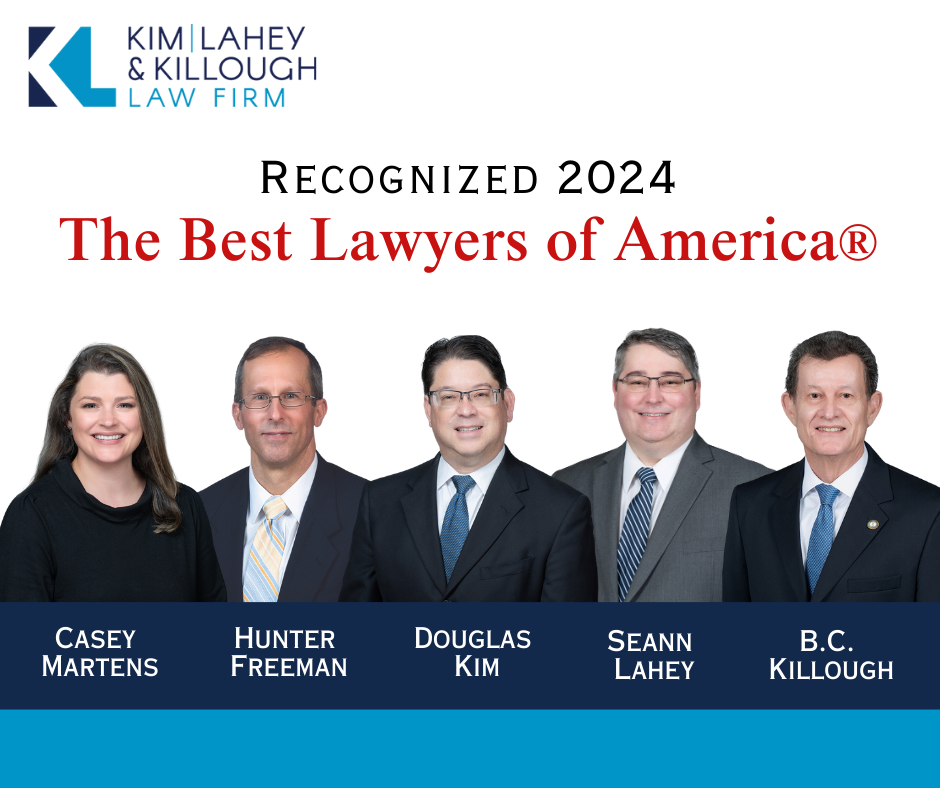
Five Kim, Lahey & Killough attorneys recognized by Best Lawyers 2024
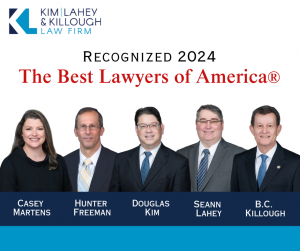 The Kim, Lahey & Killough Law Firm is pleased to announce five of our attorneys are listed in The Best Lawyers in America® 2024 edition, including four registered patent attorneys who are being recognized for their work in intellectual property law throughout the state.
The Kim, Lahey & Killough Law Firm is pleased to announce five of our attorneys are listed in The Best Lawyers in America® 2024 edition, including four registered patent attorneys who are being recognized for their work in intellectual property law throughout the state.
In Greenville, Doug Kim is recognized in the 30th edition of The Best Lawyers in America in the practice areas of intellectual property litigation, patent litigation, patent law, and trademark law. Kim has previously been recognized as a Lawyer of the Year in Greenville, SC, in two of these areas: as Trademark Lawyer of the Year in 2022 and the Patent Lawyer of the Year in 2019.
Seann Lahey joins the list this year and is recognized for his work with trademark law, while Hunter Freeman is listed for his work in intellectual property litigation, trademark law, and copyright law.
In our Charleston office, B.C. “Bill” Killough has been recognized in Best Lawyers® for the past 15 years for his work in intellectual property litigation, patent law, and trademark law. He is also listed for his work in business organizations (including LLCs and partnerships) and was The Corporate Law Lawyer of the Year for the Charleston metro in 2015.
Attorney Casey Martens is named in Best Lawyers: Ones to Watch in America™ in the practice areas of Employee Benefits (ERISA) Law, Employee Labor and Employment Law, Management Labor and Employment Law, and Labor and Employment Law Litigation. Martens practices in both the Greenville, SC, and Brevard, NC, markets.
For the 30th edition, The Best Lawyers in America received a record of more than 22.5 million peer evaluations from across the United States to identify this year’s group of honorees. The Best Lawyers in America recognizes only the top 5.3% of lawyers in the nation across 150 practice areas.
With offices in Greenville and Charleston, SC, and Brevard, NC, the Kim, Lahey & Killough Law Firm is devoted to helping clients establish, enforce, and leverage their intellectual property rights from the Upstate, to the Lowcountry to across the globe.

Six Kim, Lahey & Killough attorneys listed as 2023 Legal Elite

From left: Robert Merting, Casey Martens, Hunter Freeman, Doug Kim, Seann Lahey, B.C. Killough
Six Kim, Lahey & Killough attorneys have been named in the 2023 Legal Elite lists by Charleston and Greenville Business Magazines. Four of the six attorneys listed are recognized for their work in the areas of intellectual property and innovation, a core focus of the law firm. Other areas of recognition included work in business litigation, corporate law – business organization and employment law for both plaintiffs and defendants. The Legal Elite are chosen annually and are compiled through peer nominations from attorneys throughout the state of South Carolina in 50 legal practice areas.
Registered patent attorneys Doug Kim, Seann Lahey, and Hunter Freeman are recognized by Greenville Business Magazine and B.C. Killough is recognized by Charleston Business Magazine for their work in the area of Intellectual Property and Innovation. Hunter Freeman is further recognized for his work in Business Litigation.
Additionally, Greenville attorneys Casey Martens and Robert Merting are listed as follows: Casey Martens is recognized for her work for both defendants and plaintiffs in Employment Law and Robert Merting for his work in Corporate Law – Business Organization.
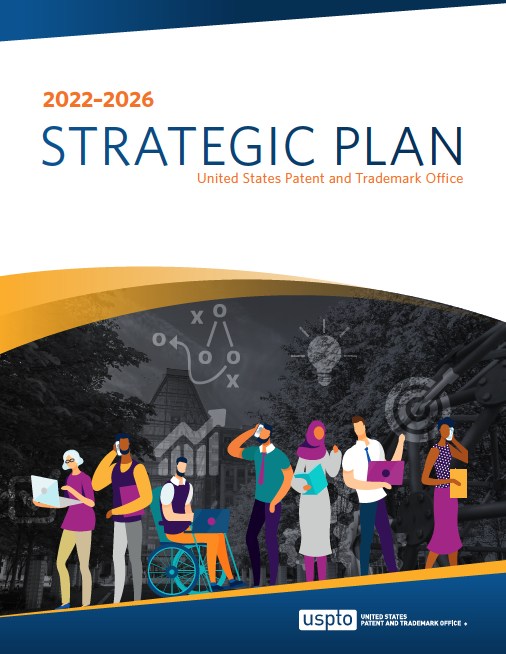
U.S. Patent and Trademark Office releases 2022-2026 Strategic Plan
Plan sets priorities that enable the agency’s new mission and vision
WASHINGTON, DC (June 7, 2023) — The U.S. Patent and Trademark Office (USPTO) today published its 2022-2026 Strategic Plan, completing a planning process that welcomed more than 150 comments on the draft version from the public and USPTO employees.
“We are reimagining the USPTO of the future, an agency that issues, upholds, and protects robust and reliable IP rights that incentivize innovation and bring more ideas to market for and from all,” said Under Secretary of Commerce for Intellectual Property and USPTO Director Kathi Vidal. “Our 2022-2026 Strategic Plan is our path forward for continued success – we thank everyone who provided feedback throughout the planning process to make this plan ambitious, focused, and relevant.”
The new plan outlines the USPTO’s mission-focused strategic goals:
1. Drive inclusive U.S. innovation and global competitiveness;
2. Promote the efficient delivery of reliable intellectual property (IP) rights;
3. Promote the protection of IP against new and persistent threats;
4. Bring innovation to impact for the public good; and
5. Generate impactful employee and customer experiences by maximizing agency operations.
The plan directly supports the USPTO’s new mission of driving U.S. innovation, inclusive capitalism, and global competitiveness, and its new vision of unleashing America’s potential, with multiple objectives directly linked to each of these five goals.
For more information on the USPTO 2022-2026 Strategic Plan, visit www.uspto.gov/StrategicPlan.

ST BARTH® Prevails in Trademark Opposition Case
Charleston intellectual property attorney B.C. Killough recently prevailed in a trademark opposition case before the Trademark Trial and Appeal Board in an opinion issued in May of 2023. The Board sustained opposition to the federal trademark registration of Poupette St Barth, which was deemed to be confusingly similar to the trademark ST BARTH®.
intellectual property attorney B.C. Killough recently prevailed in a trademark opposition case before the Trademark Trial and Appeal Board in an opinion issued in May of 2023. The Board sustained opposition to the federal trademark registration of Poupette St Barth, which was deemed to be confusingly similar to the trademark ST BARTH®.
Brands are important and valuable assets of companies, even though that value may not appear on a balance sheet. Monitoring brands used by competitors is an important part of an IP portfolio strategy. If a trademark owner believes they would be harmed by federal registration of a similar mark, they can file an opposition to the application for registration within a very limited opposition period. Monitoring of trademark applications at the United States Patent and Trademark Office provides intellectual property attorneys the ability to timely oppose the registration of conflicting marks to protect the client’s brands and prevent consumer confusion.
The Opposer in this case used ST BARTH to identify high-end luxury personal care products and has sold these products throughout the world since 1983. The applicant sought to register Poupette St Barth for personal care products with the United States Patent and Trademark Office.
The Board concluded that the marks are confusingly similar and refused to register Poupette St Barth. The Board stated that “consumers familiar with Opposer’s ST BARTH mark for perfumery, cosmetics, and other personal care products may perceive Applicant’s addition of the term POUPETTE merely as a variant or line extension of Opposer’s ST BARTH mark, with both marks indicating a single source.”
Read the entire case opinion here.
Any results the lawyer or law firm may have achieved on behalf of clients in other matters do not necessarily indicate similar results can be obtained for other clients.
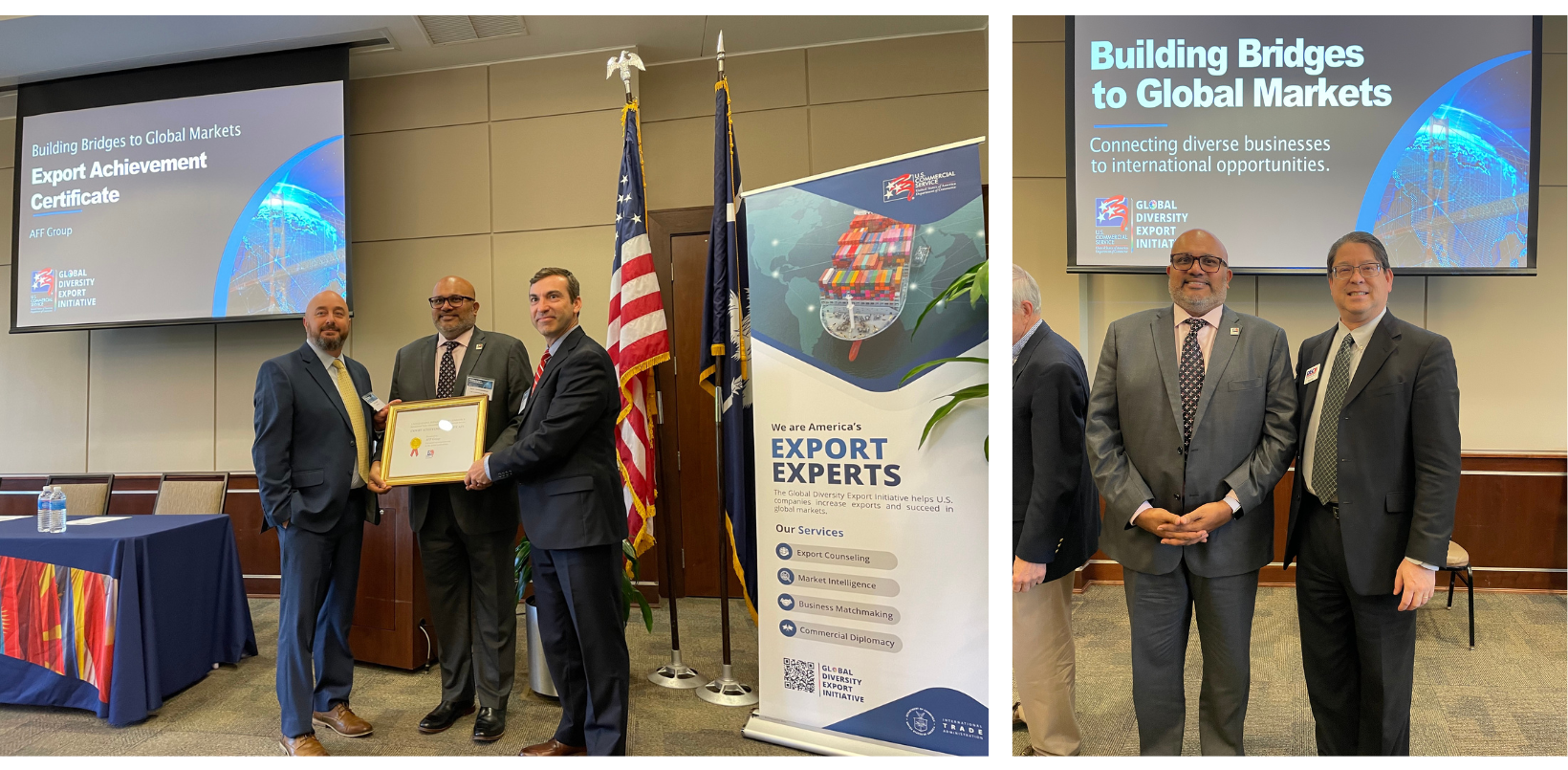
AFF Group Honored with Export Achievement Award
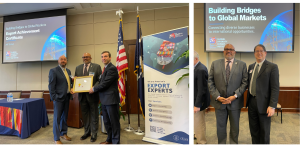 The Kim, Lahey & Killough Law Firm congratulates the AFF Group, formerly known as the American Foam & Fabric Company, for being honored with the Export Achievement Award from the U.S. Department of Commerce. This prestigious award recognizes the outstanding achievements of U.S. companies in the international market and their contributions to expanding U.S. exports.
The Kim, Lahey & Killough Law Firm congratulates the AFF Group, formerly known as the American Foam & Fabric Company, for being honored with the Export Achievement Award from the U.S. Department of Commerce. This prestigious award recognizes the outstanding achievements of U.S. companies in the international market and their contributions to expanding U.S. exports.
The announcement was made in April during the International Trade Administration U.S. Commercial Service’s Building Bridges to Global Markets event in Greer, SC. This regional event included included the South Carolina District Export Council and special guest Arun Venkataraman, who is the Assistant Secretary of Commerce for Global Markets, and Director General of the U.S. and Foreign Commercial Service.
Kim Lahey & Killough’s founding attorney Doug Kim serves on the SC District Export Council. He remarked, “It’s a pleasure to see clients recognized for their success. This well-deserved recognition is a testament to AFF’s efforts to expand their market and business reach internationally.”
The AFF Group has been a leading provider of high-quality foam and fabric products for over 60 years. The company operates several manufacturing facilities in the United States, including its headquarters in Lyman. Over the years, the company has developed a reputation for excellence in product quality and customer service.
In recent years, AFF Group has expanded its business into international markets, exporting its products to countries all over the world. The company’s success in the international market is a testament to its commitment to innovation, quality, and customer satisfaction.
AFF Group CEO Ben Leinster commented, “We are incredibly honored to be recognized by the U.S. Department of Commerce for the Export Achievement Award. Whether deciding which foreign markets to pursue or coordinating logistics of a trip, we are grateful for the assistance of the partnership with the U.S. Department of Commerce and the SC District Export Council.”
In addition to AFF, Greenville-based IT company Blue Eye Soft was also recognized with an Export Achievement Award. The U.S. Department of Commerce’s International Trade Administration (ITA) presents the Export Achievement Award to companies that have demonstrated a commitment to exporting and increasing their international sales. The award recognizes companies that have shown exceptional progress in expanding their exports or penetrating new markets.
The ITA plays an important role in promoting U.S. exports and supporting U.S. companies in the international market. The agency works with U.S. businesses to identify new export opportunities, provide market intelligence, and develop export strategies. The ITA also provides technical assistance and funding to help companies expand their international sales.


